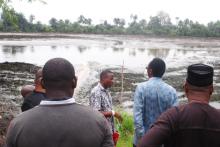The decision of the Appeal Court at The Hague on 18 December 2015 that the four farmers whose lands and creeks were damaged by Shell’s pollution can indeed sue the oil mogul in The Netherlands has come as refreshing news. While this is a sweet step towards total victory, we are saddened that while the case drags on the polluted lands are yet to be remediated and the victims are still deprived of the use of their lands and creeks.
Shell’s oil spills in the Niger Delta are well known and the oil company’s claims that such spills are caused by third party interferences often ring hollow, if you know the real story. The history of the spin by Shell that oil spills from their facilities are caused by third parties has been on since the 1980s. Although there was a spike in such interferences between 2005 and 2009 due to armed responses in the region, much of the spills are still attributable to equipment failure or poor maintenance.
In the particular set of cases filed in the court at The Hague in 2008, farmers from Ikot Ada Udo (Akwa Ibom State), Oruma (Bayelsa State) and Goi (Rivers State) all in the Niger Delta complained of devastating spills they suffered between 2004 and 2008. In Oruma it was an eruption from a pipeline buried to a depth of more than a metre underground. At Ikot Ada Udo it was capped well head that spewed crude oil into the air, land and waters for months before Shell stopped it. Goi is a special case. The community has neither an oil well nor a pipeline crossing its territory. What Goi has is a creek that is fed by an upstream river that brings crude oil spill from an oil facility. It also receives tidal flows from Bodo a bit downstream. The crude oil spill and resulting fire that sacked this community came from Shell’s spills from other communities.
It was therefore a surprise that the Court of first instance only found Shell culpable over the oil spill at Ikot Ada Udo and not for the ones at Oruma and Goi in its judgement of January 2013.
The farmers and Friends of the Earth Netherlands approached the court of appeal demanding an overturning of decisions that cleared Shell of responsibility. Shell also appealed against the verdict against them with regard to the case from Ikot Ada Udo. The Dutch Court decided against Shell’s claim that the court is incompetent to rule on the activities of it’s subsidiary in Nigeria.
With the dismissal of Shell’s competence argument, the substantive case can now proceed in earnest and the question of Shell’s guilt over the damage of the farmers’ lands will now be taken on.
Geert Ritsema, head of campaign at Friends of the Earth Netherlands, also known as Milieudefensie, applauded the verdict as a big blow to Shell’s seven years old argument that the Dutch court cannot rule on the oil pollution in Nigeria. According to him, “these delaying tactics have now come to an end and Shell have to take responsibility for damage to the environment and the property of the Nigerian farmers.”
This is a very significant judgement. It cements the fact that a transnational corporation cannot avoid being held to account at home for their environmental crimes or misbehaviour in other countries. The road to victory is still long, but this again is an example of a David and Goliath confrontation where the oil giant comes with assortment of judicial weapons and the poor farmers beat them with mere slings and stones.
Ken Saro-Wiwa must be chuckling at this turn of events. In his last testament before his execution 20 years ago, Saro-Wiwa declared that Shell will one day be in the dock. Now, the presence of Shell in the dock is not only happening but will pick up speed.
It is clear that Shell is stuck on the losing track and it is best for the oil mogul to accept responsibility, clean up its mess and give the poor farmers the possibility of recovery from the ecocide visited upon their lands.





